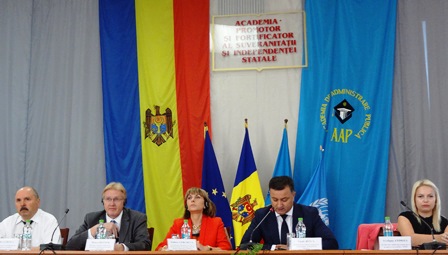
Improving the quality of the housing stock, making it more disaster resilient, increasing its energy-efficiency and making it more affordable for the population are some of the most pressing housing challenges faced by the Republic of Moldova. These are the main findings of the 2nd UNECE Country Profile on Housing and Land Management of the Republic of Moldova presented today in Chisinau.
Since its independence in 1991, the Republic of Moldova has considerably improved its housing legislation to accompany its transition to a market economy. Several laws were adopted recently, including the Law on Housing (2014) and the Law on Energy Performance of Buildings (2014). However, despite all efforts, many challenges in housing and urban development policy still remain.
Soviet-era multi-apartment buildings, which represent 63% of the housing stock in the capital Chisinau and 62% in Balti, the country’s third largest city, are rapidly deteriorating, and are in urgent need of repair.
Most of them are not energy-efficient: buildings consume 40% of the country’s total energy usage, of which 65% is consumed by residential buildings alone. Considering that the country imports 95% of its energy, raising housing energy-efficiency is a top priority.
Disaster Risk Reduction principles, as set in the New Sendai Framework for Disaster Risk Reduction 2015-2030, have to be included in any urban development planning to mitigate existing risks and avoid new ones thus contributing to sustainable development..
The population has low access to water and sanitation. In 2012, about 1.5 million people were served by the public water supply system. This represented 42.1% of the population (68.9% urban and 22.7% rural). 761,000 persons had access to sanitation - 50.1% in urban areas and only 1.0% in rural areas.
The utility infrastructure for water supply has not been upgraded for many decades; its operational efficiency is low. It is estimated that modernizing pumping equipment in water supply and sanitation networks could reduce electricity consumption by 25-30%.
The Government adopted the goal to reduce energy consumption in buildings by 10% before 2020. It is also taking measures to increase the housing stock, for example via a project, co-financed through a loan from the Council of Europe Development Bank, destined to provide social housing to 4,000 people.
From an institutional perspective, effective implementation of the legislation is lagging behind and hinders progress.
The country must also complete its real estate register - some 15% of the country’s properties are unregistered – and update its Master Plans. In most cases, Master Plans do not even exist and, where they do, most are outdated, dating back to Soviet times. Only 33% of urban settlements and 1% of rural settlements have updated Master Plans.
The Country Profile contains a series of recommendations for the government, such as amending the Housing Code on the work of condominiums, and new laws providing clear regulations on the establishment and operation of homeowners associations. It also recommends strengthening energy-efficiency standards for renovation of residential buildings, as well as new construction. It calls for strategic urban planning, and clearer responsibilities for different levels of government in the implementation of urban plans to make cities and the society more resilient.
The findings and recommendations of the Country Profile were discussed at a workshop in Chisinau on 8 September. Participants recommended the development and implementation of a National Action Plan, based on these recommendations.
Speaking at the workshop, Vasile Bîtca, Minister of Regional Development and Construction, reiterated the country’s existing challenges in the housing sector, including the wide gap between urban and rural populations in the access to housing utilities such as water and sanitation. He also emphasized the need to refurbish the housing stock based on energy efficiency principles and the need to develop Master Plans. He said that the Ministry is currently engaged in a project that will provide 450 apartment units to vulnerable groups. He concluded by confirming the Government’s commitment to the action plan that will be developed based on the Country Profile’s recommendations.
The workshop was jointly organized by the Ministry of Regional Development and Construction of the Republic of Moldova, UNECE and UN-Habitat, and supported by funds from the United Nations Development Account project “Strengthening National Capacities for Sustainable Housing”.
For more information, please contact:
Cecilia D. Batac
Programme Coordinator, “Country Profiles on Housing and Land Management”
Housing and Land Management Unit
Email: [email protected]
Telephone: +41 (0)22 917 21 38
Note to editors
Country profiles are “snapshots” of the housing and land issues within a country. They are major undertakings where in-depth research and discussion between partners form a large part of the work. They are conducted upon request of UNECE member States, coordinated by the secretariat and drafted by independent international experts. The country profiles contain recommendations for improving policies and practices in housing, urban development and land management. The UNECE Committee on Housing and Land Management monitors and supports the implementation of country profile recommendations - for example, through technical model projects.
Please see more information on the country profiles at http://www.unece.org/housing-and-land-management/areas-of-work/country-profiles-on-housing-and-land-management.html

